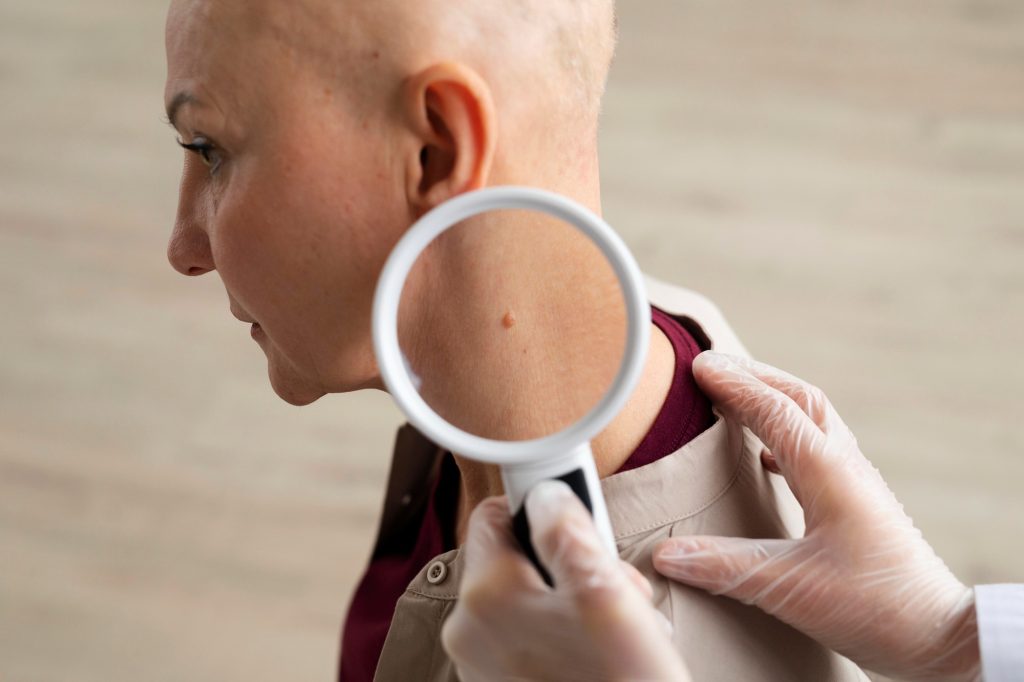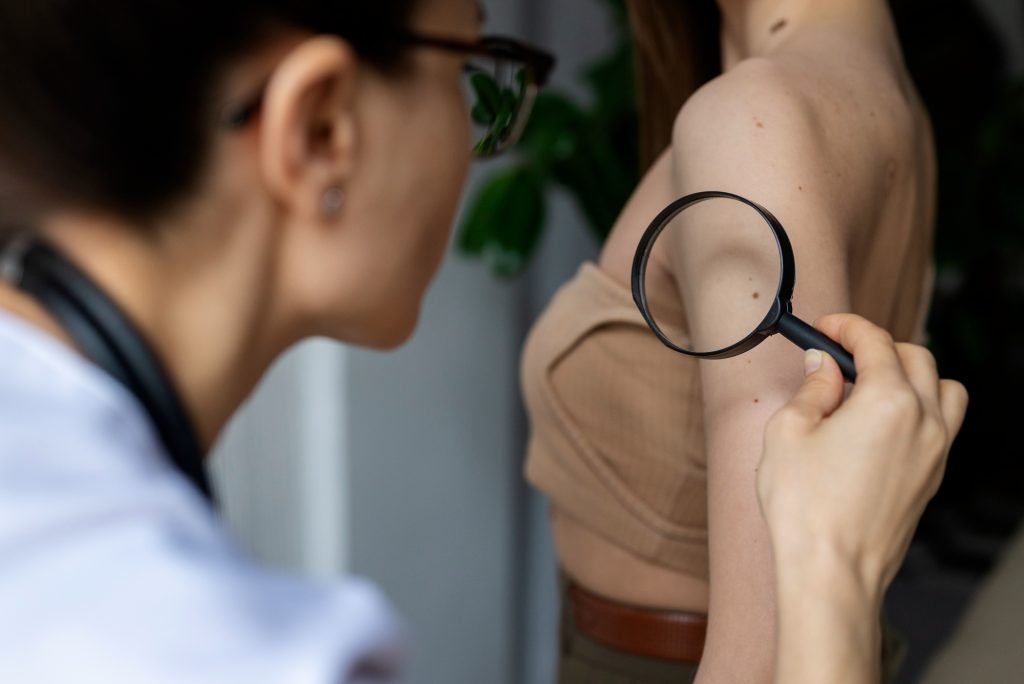Discover the importance of skin cancer screenings and whether or not you should be concerned.
Should I Be Concerned About Skin Cancer Screenings?

Skin cancer is a serious issue that affects millions of people every year. Understanding the importance of skin cancer screenings can help you make an informed decision about your own health. In this article, we’ll dive into the world of skin cancer and explore the various aspects of screenings. So, sit back, relax, and let’s explore this topic together!
Understanding Skin Cancer
Before we can fully grasp the significance of skin cancer screenings, it’s important to understand what exactly skin cancer is. Skin cancer occurs when the cells in your skin start to divide and grow abnormally. This abnormal growth can lead to the formation of tumors or lesions on the skin. These tumors can be benign (non-cancerous) or malignant (cancerous).
There are several types of skin cancer, each with its own characteristics and risks. When it comes to skin cancer, knowledge is power. Let’s take a closer look at the three main types of skin cancer: basal cell carcinoma, squamous cell carcinoma, and melanoma.
Types of Skin Cancer
Basal cell carcinoma is the most common type of skin cancer, accounting for about 80% of all cases. It usually appears on sun-exposed areas like the face and neck. This type of skin cancer grows slowly and rarely spreads to other parts of the body. However, if left untreated, it can cause significant damage to surrounding tissues and structures.
Squamous cell carcinoma is the second most common type of skin cancer, accounting for about 20% of all cases. It is often found on parts of the body exposed to the sun, such as the head, neck, hands, and forearms. Squamous cell carcinoma can grow more quickly than basal cell carcinoma and has a higher risk of spreading to other parts of the body.
Melanoma, although less common, is the most dangerous of the three types of skin cancer. It can develop from existing moles or appear as new growths on the skin. Melanoma has the potential to spread to other parts of the body if not detected and treated early. It is crucial to be aware of any changes in the size, shape, or color of moles and seek medical attention if necessary.
Causes and Risk Factors
Now that we know the different types of skin cancer, let’s explore what causes this condition. Prolonged exposure to ultraviolet (UV) radiation from the sun or tanning beds is a significant risk factor for developing skin cancer. When your skin is exposed to UV radiation, it can cause damage to the DNA in your skin cells, leading to abnormal growth and the potential development of cancer.
Other factors can increase your chances of developing skin cancer. A family history of the disease can play a role, as certain genetic mutations can make individuals more susceptible to skin cancer. Fair-skinned individuals are also at a higher risk, as they have less melanin, the pigment that provides some protection against UV radiation.
A weakened immune system can also increase the risk of developing skin cancer. This can be due to certain medical conditions, such as HIV/AIDS, or the use of immunosuppressive medications. Additionally, a history of sunburns, especially during childhood, can increase the risk of developing skin cancer later in life.
It is important to be aware of these risk factors and take necessary precautions to protect your skin from harmful UV radiation. This includes wearing sunscreen with a high SPF, seeking shade during peak sun hours, and wearing protective clothing, such as wide-brimmed hats and long-sleeved shirts.
By understanding the different types of skin cancer and the factors that contribute to its development, we can take proactive steps to protect ourselves and detect any potential signs early on. Regular skin cancer screenings and self-examinations are crucial in identifying any suspicious moles or lesions and seeking prompt medical attention when needed.
The Importance of Skin Cancer Screenings
Now that we have a good understanding of skin cancer, it’s time to delve into the importance of screenings. The early detection and treatment of skin cancer can significantly increase your chances of a successful outcome. Regular screenings enable healthcare professionals to identify suspicious moles or lesions and take appropriate action.
Early Detection and Treatment
As with any disease, catching skin cancer early gives you the best shot at beating it. Skin cancer screenings can help detect abnormalities that may be signs of cancerous cells. By identifying these issues early on, healthcare professionals can recommend further tests or treatment options, ensuring the best possible outcome for you.
Early detection is crucial because it allows for prompt intervention. Skin cancer, when caught in its early stages, is highly treatable. In fact, the five-year survival rate for melanoma, the deadliest form of skin cancer, is around 99% when detected early. This statistic highlights the importance of regular screenings in preventing the progression of the disease.
During a skin cancer screening, a healthcare professional will carefully examine your skin, looking for any suspicious moles, growths, or discolorations. They may use a dermatoscope, a handheld device that magnifies the skin’s surface, to get a closer look at any suspicious areas. This thorough examination allows for the identification of potential skin cancer at its earliest stage, increasing the likelihood of successful treatment.
Who Should Get Screened?
While everyone should be concerned about skin cancer, certain individuals are at higher risk and should consider regular screenings. If you have a family history of skin cancer, a personal history of the disease, or have spent a significant amount of time in the sun, getting screened is a proactive step towards taking control of your health.
Individuals with fair skin, light-colored hair, and light-colored eyes are also at a higher risk of developing skin cancer. This is because their skin produces less melanin, the pigment that provides some protection against the harmful effects of the sun’s ultraviolet (UV) radiation. Additionally, those who have had severe sunburns in the past or have used tanning beds are more susceptible to developing skin cancer.
Regular screenings are particularly important for individuals who work outdoors or participate in outdoor activities frequently. Occupations such as construction, landscaping, and lifeguarding often involve prolonged sun exposure, increasing the risk of developing skin cancer. By undergoing regular screenings, these individuals can detect any potential issues early on and take the necessary steps to protect their health.
It’s important to note that skin cancer can affect people of all ages, so even young individuals should consider getting screened. While the risk of developing skin cancer increases with age, cases of skin cancer in younger individuals are not uncommon. By establishing a habit of regular screenings early in life, individuals can develop a proactive approach to their skin health and minimize the risk of developing advanced-stage skin cancer later on.
The Process of Skin Cancer Screening
Curious about what happens during a skin cancer screening? Let’s dive into the details!
During a skin cancer screening, you can expect a thorough examination of your skin from head to toe. This comprehensive approach ensures that no suspicious spots or growths are overlooked. The healthcare professional will carefully inspect every inch of your skin, paying close attention to areas that are commonly exposed to the sun, such as your face, neck, arms, and legs.
To get a closer look at any areas of concern, the healthcare professional may use a dermatoscope. This special magnifying lens allows them to examine the skin in greater detail, revealing any subtle changes or abnormalities that may not be visible to the naked eye. Rest assured, the use of a dermatoscope is painless and non-invasive.
As the healthcare professional examines your skin, they will be on the lookout for any suspicious spots or growths. These may include moles that have irregular borders, uneven coloring, or a larger diameter than usual. They will also pay attention to any new growths or changes in existing moles. It’s important to note that not all abnormal spots turn out to be cancer, but identifying them early can help prevent potential complications.
Interpreting Screening Results
Once the examination is complete, your healthcare provider will discuss the results with you. If any suspicious spots or growths are found, they may recommend a skin biopsy to further investigate. A skin biopsy involves removing a small sample of the suspicious area for laboratory analysis. This procedure allows healthcare professionals to determine whether the abnormality is cancerous or benign.
It’s essential to remember that receiving a recommendation for a skin biopsy does not necessarily mean you have skin cancer. Many biopsies come back as benign, providing peace of mind for patients. However, it’s crucial to follow through with the biopsy to ensure a thorough evaluation and accurate diagnosis.
If the biopsy results confirm the presence of skin cancer, your healthcare provider will discuss the next steps with you. Treatment options may include surgical removal of the cancerous tissue, radiation therapy, or other targeted therapies. The specific treatment plan will depend on factors such as the type and stage of the skin cancer, as well as your overall health.
Regular skin cancer screenings are an essential part of maintaining your overall health and well-being. By detecting skin cancer early, the chances of successful treatment and a positive outcome are significantly increased. Remember to protect your skin from harmful UV rays by wearing sunscreen, protective clothing, and seeking shade when the sun is strongest.
Potential Risks and Concerns of Skin Cancer Screenings
Like any medical procedure, skin cancer screenings come with their own set of risks and concerns. Let’s take a closer look!
False Positives and Overdiagnosis
One of the concerns with skin cancer screenings is the possibility of false positives, where a spot may be flagged as abnormal but turns out to be harmless. This can lead to unnecessary worry and potentially invasive procedures. Overdiagnosis is another consideration, where harmless growths may be labeled as cancerous, leading to overtreatment.
Anxiety and Emotional Impact
Waiting for screening results can undoubtedly be anxiety-inducing. The fear of hearing the word “cancer” can weigh heavily on our minds. However, it’s important to remember that anxiety is a normal response and that support is available to help you navigate through this emotional journey.
Making an Informed Decision about Skin Cancer Screenings
As with any medical decision, it’s essential to weigh the pros and cons before jumping into skin cancer screenings.

Discussing with Your Healthcare Provider
If you’re unsure whether skin cancer screenings are right for you, don’t hesitate to discuss your concerns with your healthcare provider. They can provide guidance based on your medical history, lifestyle, and individual risk factors.
Weighing the Pros and Cons
Ultimately, the decision to undergo skin cancer screenings is a personal one. Considering the potential benefits of early detection and treatment alongside the risks of false positives and overdiagnosis can help you make an informed choice that aligns with your individual circumstances.
So, should you be concerned about skin cancer screenings? The answer ultimately lies within you. By arming yourself with knowledge and understanding, you can make an informed decision that puts your health first. Remember, regular screenings, coupled with sun protection and a healthy lifestyle, can be crucial in the battle against skin cancer. Stay informed, stay protected, and stay sunny!






